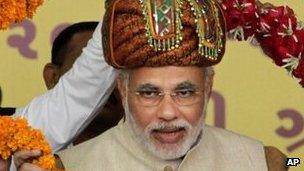Gujarat riots: Narendra Modi criticised over damage
- Published

Mr Modi denies any wrongdoing over the riots but has not apologised for them
A court in India's Gujarat state has criticised Chief Minister Narendra Modi's government for not protecting religious buildings in the 2002 riots.
It said the government's "negligence" and "inaction" led to widescale damage and ordered compensation for more than 500 structures.
More than 1,000 people, mostly Muslims, died in riots that erupted after 60 Hindus were killed in a train fire.
Mr Modi has been accused of allowing the riots but denies any wrongdoing.
'Inaction'
The High Court was ruling on Wednesday on a petition filed by the Islamic Relief Committee of Gujarat.
The petitioner wanted the state government to pay for damages to religious buildings during the riots.
The judges said that "inadequacy, inaction and negligence" by the state government had led to the destruction of religious structures across the state.
The government has paid for the rebuilding of houses and commercial property, but consistently refused to pay for religious property.
The court set up a 26-member panel to oversee the process of compensation.
Mr Modi has been dogged by allegations of turning a blind eye, or even backing the riots. He has always denied any wrongdoing but has not apologised for the riots.
Last year, a senior police officer made a sworn statement to the Supreme Court that Mr Modi deliberately allowed the riots because Hindus should be allowed to vent their anger.
The 2002 riots were one of India's worst outbreaks of religious violence.
The cause of the train fire is a matter of fierce debate, although Muslims were blamed at the time.
- Published1 February 2012
- Published13 October 2011
- Published19 September 2011
- Published9 November 2011